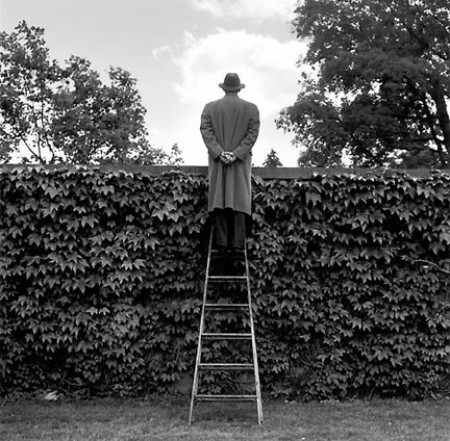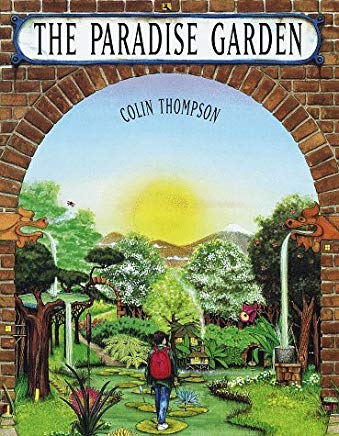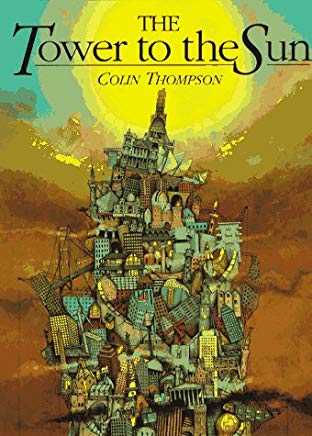The Blog
Blog Entry
Angry Anymore

Colin Thompson draws teeming urban landscapes that look like the inside of your brain. “The noise was driving Peter crazy,” begins The Paradise Garden alongside what is apparently a red brick Georgian city block rendered in hellishly busy cross-section: roosters crowing, and bagpipes and tubas and opera singers at the heights of their expression. But that’s not nearly all: this English-born author and illustrator seems capable of just about infinitely riffing on all of the riotous disorder surrounding a boy curled up on his bed in the corner of a little gray room that you’d probably miss the first and second and twentieth times you read this book if I hadn’t just told you.
Look closely. His arms are defending his head – so it’s finally just as easy to imagine Peter’s torment deriving from such fantastical happenings as airplanes flying at the building, and cars running into lamp posts, and drink trays falling down stairs, and whoopee cushions, and lightning-and-thunderous toilets, and toy trains, and Gucci brand mousetraps, and volcanoes erupting in bottles….
Phew. That’s a lot of torment. Do you ever kind of worry that potentially useless information is taking up limited space in your mental hard drive, or nudging something useful out, then someone is quick to weigh in that no, don’t worry, you could probably keep on filling up empty spaces forever? Which is pretty great news for a lot of us, I bet, and maybe not so reassuring for others.
As a matter of policy here, I try not to dig any deeper into particular artists than the space they allow me on the page. This is because, one, I never quite believed that business about the scalable hard drive, and two, more often than not the trail of biographical cookie crumbs leads nowhere especially illuminating. Also, I don’t want to sound like a pinhead, or stalker, though in hoping to discover whatever other hallucinatory confections Colin Thompson cooked up, I found myself visiting his personal website and skipping through the bits about his wives and grandchildren to these paragraphs practically thrumming with uppercase fonts:
“In my early twenties I suffered with terrible depression and, on three different occasions, spent three months in three different hospitals….
“If you suffer with depression ALWAYS REMEMBER it is NOT something you should ever be ashamed of and try to hide. I CAN’T EMPHASIZE THIS ENOUGH. IT IS NOT YOUR FAULT….
“For no reason I have ever been able to explain, my depression went when I was 25 and has never returned….”
Well, that seems worth noting. And this: “I feel that if a children’s book cannot be enjoyed properly by adults there is something wrong with either the book or the adult reading it.”
Colin Thompson, Olé!
The author says a special thank you in the afterword to the employees of Kew Gardens where he was presumably permitted to set up his easel and runaway imagination, but not, I guess, to sleep over and pick bananas and go fishing and swimming naked in the lily ponds. In the book this is simply a matter of Peter telling his apparently overwrought mother that he is going to visit his apparently alienated father, and not checking back in… for three months. There’s not very much more exposition than that, and yet that is somehow, inexplicably, everything and enough. No psychobabble, just time, the snails and first flowers of spring giving way to long evenings and shadows, then leaves turning gold and receding.
“Nothing at home had changed,” observes Peter once he has made his way back through the gate in the wall that separates the Paradise Garden from the city, still noisy, still unruly, still there, though at least it’s not all in his imagination, which he has better uses for.



